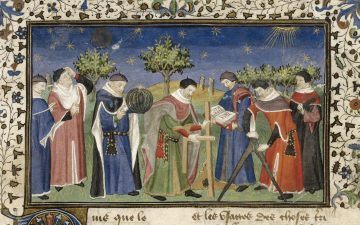Tom McLeish in Aeon:
 To riff on the opening lines of Steven Shapin’s book The Scientific Revolution (1996), there is no such thing as a science-religion conflict, and this is an essay about it. It is not, however, another rebuttal of the ‘conflict narrative’ – there is already an abundance of good, recent writing in that vein from historians, sociologists and philosophers as well as scientists themselves. Readers still under the misapprehension that the history of science can be accurately characterised by a continuous struggle to escape from the shackles of religious oppression into a sunny secular upland of free thought (loudly expressed by a few scientists but no historians) can consult Peter Harrison’s masterly book The Territories of Science and Religion (2015), or dip into Ronald Numbers’s delightful edited volume Galileo Goes to Jail and Other Myths about Science and Religion (2009).
To riff on the opening lines of Steven Shapin’s book The Scientific Revolution (1996), there is no such thing as a science-religion conflict, and this is an essay about it. It is not, however, another rebuttal of the ‘conflict narrative’ – there is already an abundance of good, recent writing in that vein from historians, sociologists and philosophers as well as scientists themselves. Readers still under the misapprehension that the history of science can be accurately characterised by a continuous struggle to escape from the shackles of religious oppression into a sunny secular upland of free thought (loudly expressed by a few scientists but no historians) can consult Peter Harrison’s masterly book The Territories of Science and Religion (2015), or dip into Ronald Numbers’s delightful edited volume Galileo Goes to Jail and Other Myths about Science and Religion (2009).
Likewise, assumptions that theological and scientific methodologies and truth-claims are necessarily in philosophical or rational conflict might be challenged by Alister McGrath’s book The Territories of Human Reason (2019) or Andrew Torrance and Thomas McCall’s edited Knowing Creation (2018). The late-Victorian origin of the ‘alternative history’ of unavoidable conflict is fascinating in its own right, but also damaging in that it has multiplied through so much public and educational discourse in the 20th century in both secular and religious communities. That is the topic of a new and fascinating study by the historian James Ungureanu, Science, Religion, and the Protestant Tradition (2019). Finally, the concomitant assumption that scientists must, by logical force, adopt non-theistic worldviews is roundly rebutted by recent and global social science, such as Elaine Eklund’s major survey, also published in a new book, Secularity and Science (2019).
All well and good – so the history, philosophy and sociology of science and religion are richer and more interesting than the media-tales and high-school stories of opposition we were all brought up on. It seems a good time to ask the ‘so what?’ questions, however, especially since there has been less work in that direction. If Islamic, Jewish and Christian theologies were demonstrably central in the construction of our current scientific methodologies, for example, then what might such a reassessment imply for fruitful development of the role that science plays in our modern world? In what ways might religious communities support science especially under the shadow of a ‘post-truth’ political order? What implications and resources might a rethink of science and religion offer for the anguished science-educational discussion on both sides of the Atlantic, and for the emerging international discussions on ‘science-literacy’?
More here.
